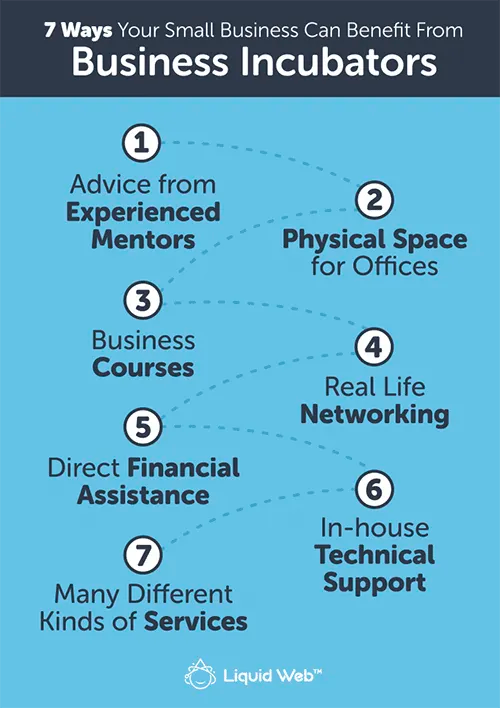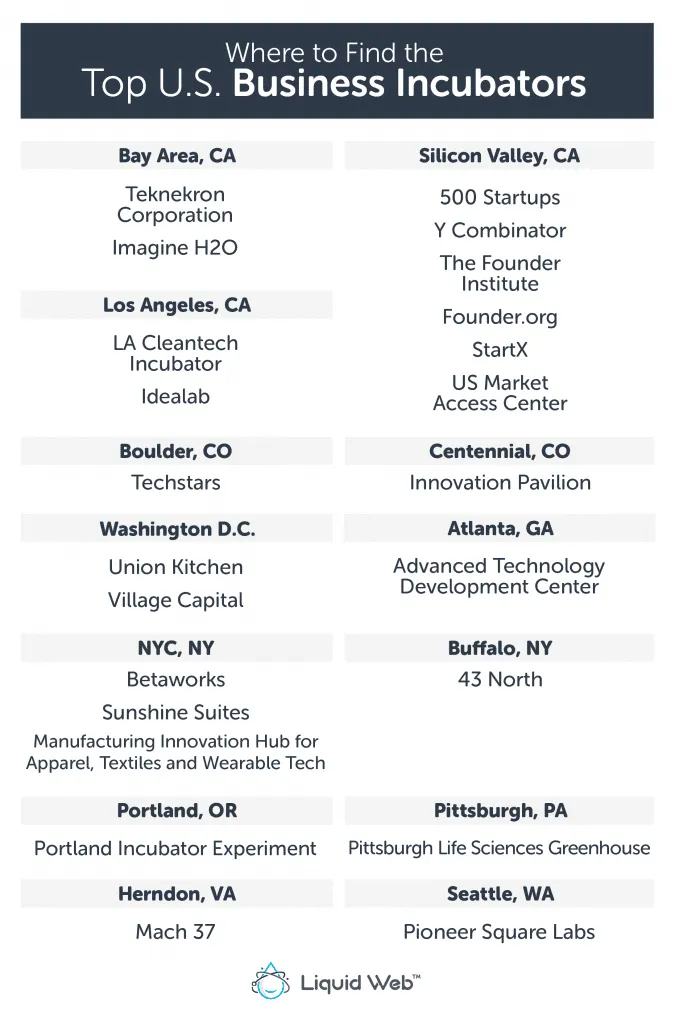Business incubators give brand-new businesses access to the resources and mentoring they need to thrive. Around the world, business incubators are nurturing new companies in every industry and showing them how to grow beyond their in-house assistance.
Does your business need one? Not necessarily. But the experience and assistance may be invaluable. A business incubator may be just the thing to keep your new store from becoming a statistic.
How do you know if an incubator is right for you? This guide can help.
Business Incubators Make It Easier To Start Your Business
Starting a new business is hard work, particularly without the right tools and opportunities. Incubators strive to provide everything a new business needs which typically includes:
- Advice from experienced mentors
- Physical space for offices
- Business courses
- Networking
- Financial assistance
- Technical support
- Services
Access to investor funding is a really huge potential benefit, too. At some incubators, potential investors are around to provide businesses with their first funding in exchange for equity stakes. You can also learn valuable information about loan opportunities from banks and alternative lenders if giving away equity isn’t part of your business plan.

To be successful in starting your ecommerce business, you’ll need to put in a lot of effort. Incubators help you channel these efforts in the right direction.
How Do Business Incubators Work?
With the right resources, entrepreneurs can set up their businesses for a successful start and paced growth. New business owners often don’t know what they’re missing and aren’t sure where to start with their early research.
An incubator may provide you with a basic office lease, consulting, networking, and mentoring — usually for a fee. As you grow, you can scale up or down quickly in the services you use without penalty.
These organizations may be for-profit or nonprofit and are frequently associated with a specific industry, city, or academic institution. Their mission is generally to boost the economy by enabling new businesses to grow sustainably and successfully. Of course, how they achieve their mission and what they do to support businesses may vary tremendously.
When you’re ready to move your business out on its own, you’ll have an established network you can refer to later if you need support.
Benefits of a Business Incubator
New ecommerce businesses can potentially improve their survival rate and entrepreneurs can learn about their companies with support and guidance. It’s a place that naturally leads to business relationships and opportunities as startups learn and grow together.
Beyond networking, there are other potential benefits such as:
- Expertise: Lawyers, CPAs, marketing consultants, business analysts, and other experts may be in-house or on a list available to all businesses.
- Better mentoring: A-list entrepreneurs who’ve been where you are now are typical on-hand mentors.
- Community: If life gets lonely as a new business, having others around who can empathize can be helpful when the going gets tough.
- Reduced overhead: Basics like a receptionist, meeting spaces, and assistance from a business research assistant can be expensive, but an incubator can make these benefits much more affordable.
- Discounts: Special group discounts are often included in your membership.
There may be a variety of additional benefits depending on the nature of the program, and the partnerships they’ve cultivated for their members.
Startup Office Lease Through an Incubator Program
For many businesses, incubators provide their first office space. This is usually at a below-market rate so your company can focus on business operations and not have to worry so much about covering rent. Also, your lease will probably have a great deal of flexibility so you can adjust the space you’re using and accommodate the change in your company.
Since you’re in the same building as other new companies and among others from your industry, you have the opportunity to network closely with people who face many of the same concerns and challenges.
Even if your program doesn’t include a lease, the list of other participants gives you opportunities to connect with businesses you may never have met otherwise.
Networking With Other Incubator Participants
Your fellow startups can actually teach you a lot. Even if you’re technically competitors, it’s still worthwhile to meet other business owners and talk about issues facing your industry. Within an incubator, you’ll have plenty of opportunities to find others who have insightful contributions to share.

Meetups, discussion nights, and social activities give you a sense of camaraderie and motivation. Connecting with others gives you a chance to ask questions and learn who the other participants are outside of work. It’s also a way to get business advice. Those who are further along in their entrepreneurial journey may share tips and ideas with you. Don’t be afraid to ask — as long as you’re also open to sharing information that’s helped you. Remember, what goes around comes around. Build goodwill and be a positive influence.
That good karma you’re building will come in handy when you start promoting your business. Aside from customers, some of the most important people you’ll promote your business to will be within your business world.
Find Investors for Your Ecommerce Business
If you’ve ever wondered where you’ll find your first investors, an incubator may be right for you. That’s because incubators often host invitation-only investment nights and pitch events where you can interact directly with potential investors and learn how to explain your company’s value proposition.
Those first investments can make reaching your business dreams a lot more realistic and accessible.
Who Shouldn’t Use a Business Incubator
Business incubators may not be very helpful for some businesses. For instance, if you’re an experienced business owner with adequate resources, incubators may not be as valuable. If it’s not specific to your industry and doesn’t include mentors and resources that are relevant to you, that could also pose significant issues.
To find out if an incubator would actually help, be sure to start with research. Talk to the coordinator or liaison and prepare a list of questions.
Here’s a list to start your research:
- What does the typical process look like for participants?
- How do I know I’ll be successful in your business incubator program?
- What is your track record with businesses in my industry?
- Who are the mentors?
- What resources are available?
- Can I talk to some graduates of the program?
As you think of other questions, be sure to jot them down. If a particular program is not the right fit, it’s easier when you can find that out before investing your time and energy into it.
If you can, consider participating in an ecommerce business incubator.
Business Incubator for Ecommerce
Business incubators provide opportunities to find tailored advice and resources that fit your ecommerce industry. It’s an industry-specific resource so you won’t have to waste time learning about issues that don’t apply to you, and everything is purpose-built for your success.
That said, there are fewer ecommerce programs because most incubators are generalists.
Why Ecommerce-Specific Business Incubators Have Added Value
No two businesses are the same, and ecommerce as an industry works differently than other areas of business operations.
Here are a few issues an ecommerce incubator may help you resolve:
- Niche research
- Product sourcing
- Patent and trademark law
- Licensing
- Import and export information
- Ecommerce technology
- Design and photography
- Forecasting
- Accounting and legal issues
- Marketing and advertising
These areas are somewhat different from other industries.
Find an Ecommerce Business Incubator
Business incubator programs exist all over the country, but relocation may be necessary for the perfect opportunity. Online programs are also available.
Search The National Business Incubator Association’s business incubator database. Keep in mind that most are generalist business incubators.
You may also want to check with your local chamber of commerce and find out if the business community where you live has any additional resources.
Examples of Ecommerce Business Incubators
These business incubators specifically serve the ecommerce industry:
- Rocket Internet: Working with online companies globally, Rocket focuses largely on ecommerce. Graduates include Zalora, Westwing, Hello Fresh, and Lamoda.
- Nordic Etail: Specific to Sweden, Nordic Etail grows ecommerce companies and is a newer incubator focused on online retailing.
- A Better Lemonade Stand: An online incubator for ecommerce businesses offering growth resources, manufacturer listings, help with branding and business plans, and more.
Some incubators are more competitive than others. Many have formal arrangements and contracts, while some have very basic requirements or allow informal buy-in to access specific resources.
For some incubators, getting in is a competitive process. These are usually the organizations that invest the most in their members.
Applying for a Business Incubator
Each business incubator program has its own requirements and expectations, so it’s important to do your research. Programs that provide investment to all participants and offer the best mentoring are usually highly competitive.
During the process you may:
- File an online application at the start and wait to be called for the next steps.
- Interview with one or more of the founders — it may be required to interview in person.
- Provide financials or share financial information about your business.
- Present your business plan or pitch a panel of program advisors.
- Review a contract outlining expectations and responsibilities.
Once you’re in, incubators generally don’t provide as much pressure to succeed as accelerators do, but this is no time to kick back. You need to work hard and get moving.
Getting the Most From Your New Business Incubator
When you start the program, take every opportunity you can to work hard and learn from the mentors around you. Don’t be afraid to ask questions and take some time getting to know the program.
Learning about business incubator success stories can also help you find out how to get more out of your new business incubation program.
Many of today’s biggest companies are incubator graduates. Y Combinator, a business accelerator, is very similar to the incubators supporting small businesses, but it offers a more competitive environment and a shorter incubation time frame of just three months.
These companies are now just a few of the famous Y Combinator grads:
- Airbnb
- Dropbox
- Stripe
Feel free to use them as inspiration as you grow your business. The right support and mentoring may take your company further than you’d ever expect.
Managed WooCommerce Hosting Can Help
Fully managed WooCommerce hosting from Nexcess makes it easy to start growing your business immediately. Packed with state-of-the-art technologies, Nexcess ensures low cart abandonment while helping you maintain a high-performance WooCommerce storefront.

